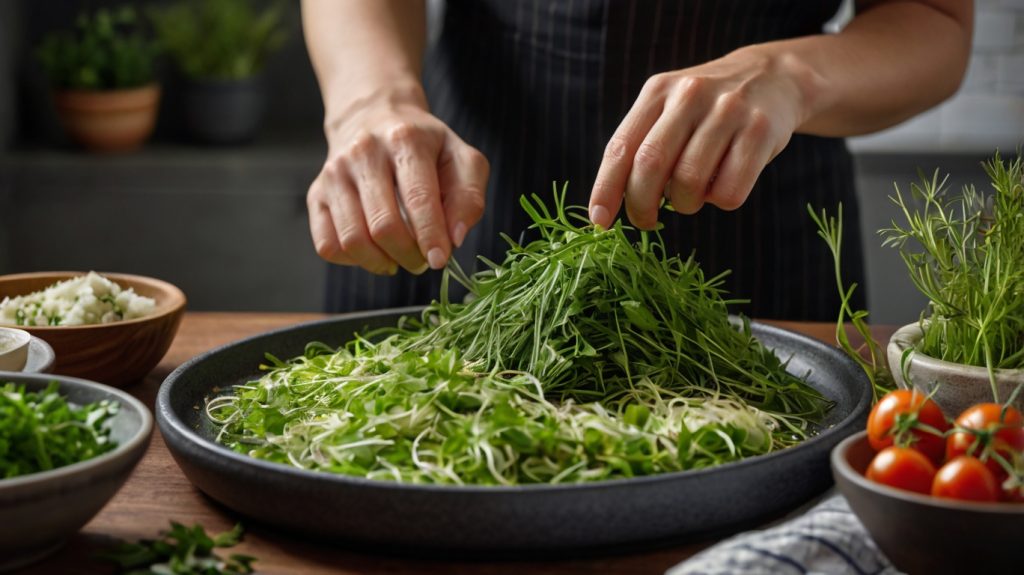The Benefits of Cooking with Fresh Herbs: Flavor & Health
Cooking with fresh herbs is one of the easiest ways to elevate the flavor, aroma, and health benefits of your meals. From basil to cilantro, fresh herbs can transform a simple dish into a culinary masterpiece. Here are some compelling reasons to incorporate fresh herbs into your cooking.
1. Enhanced Flavor and Aroma
Fresh herbs are known for their vibrant flavors and aromatic qualities. Unlike dried herbs, which can lose some of their potency during the drying process, fresh herbs retain their essential oils, giving your dishes a more intense and nuanced taste. Whether it’s the peppery kick of fresh basil in a Caprese salad or the zesty brightness of cilantro in a salsa, fresh herbs can add a distinctive flavor that dried herbs often lack.
2. Nutritional Boost
Fresh herbs are not only flavorful but also packed with essential vitamins, minerals, and antioxidants. For example, parsley is rich in vitamins A, C, and K, while basil contains vitamin K, manganese, and magnesium. Incorporating fresh herbs into your meals can provide a nutritional boost, contributing to your overall health and well-being.
3. Low-Calorie Flavor Enhancement
One of the biggest challenges in healthy cooking is adding flavor without extra calories, fat, or sodium. Fresh herbs are an excellent solution. They enhance the taste of your food naturally, allowing you to reduce the amount of salt, sugar, or unhealthy fats in your recipes. This makes fresh herbs a valuable tool for anyone looking to maintain a healthy diet.
4. Improved Digestion
Many fresh herbs have properties that can aid digestion. For instance, mint is known for its ability to soothe digestive issues, while ginger (often used as a fresh herb) can help with nausea and improve overall digestion. Incorporating these herbs into your meals can promote better digestive health.
5. Antioxidant Properties
Fresh herbs are a great source of antioxidants, which help protect your cells from damage caused by free radicals. Herbs like rosemary, thyme, and oregano are particularly high in antioxidants. Regular consumption of antioxidant-rich foods can support your immune system and reduce the risk of chronic diseases.

6. Culinary Versatility
Fresh herbs are incredibly versatile and can be used in a wide range of dishes, from appetizers to desserts. Add fresh basil to your pasta, mint to your smoothies, rosemary to your roasted vegetables, or thyme to your soups. The possibilities are endless, allowing you to experiment and discover new flavor combinations.
7. Aesthetic Appeal
Cooking with fresh herbs doesn’t just improve the taste and nutrition of your meals; it also enhances their visual appeal. Fresh herbs add a pop of color and a touch of elegance to any dish. A sprinkle of chopped parsley or a garnish of basil leaves can make your meals look as good as they taste.
8. Connection to Nature and Freshness
Using fresh herbs can help you feel more connected to nature and the seasons. Growing your own herbs, whether in a garden or on a windowsill, can be a rewarding experience. It ensures that you always have fresh, organic herbs on hand and can enhance your cooking experience by allowing you to use ingredients you’ve nurtured yourself.
9. Mindful Cooking Experience
Cooking with fresh herbs can make the cooking process more enjoyable and mindful. The act of chopping or tearing herbs releases their fragrant aromas, creating a sensory experience that can make cooking feel more like a therapeutic activity rather than a chore.
Conclusion
Incorporating fresh herbs into your cooking offers numerous benefits, from enhancing flavor and nutrition to improving digestion and providing antioxidant properties. Whether you’re a seasoned chef or a home cook, fresh herbs can elevate your dishes and contribute to a healthier, more enjoyable eating experience. So next time you’re in the kitchen, reach for a handful of fresh herbs and discover the difference they can make in your cooking.



